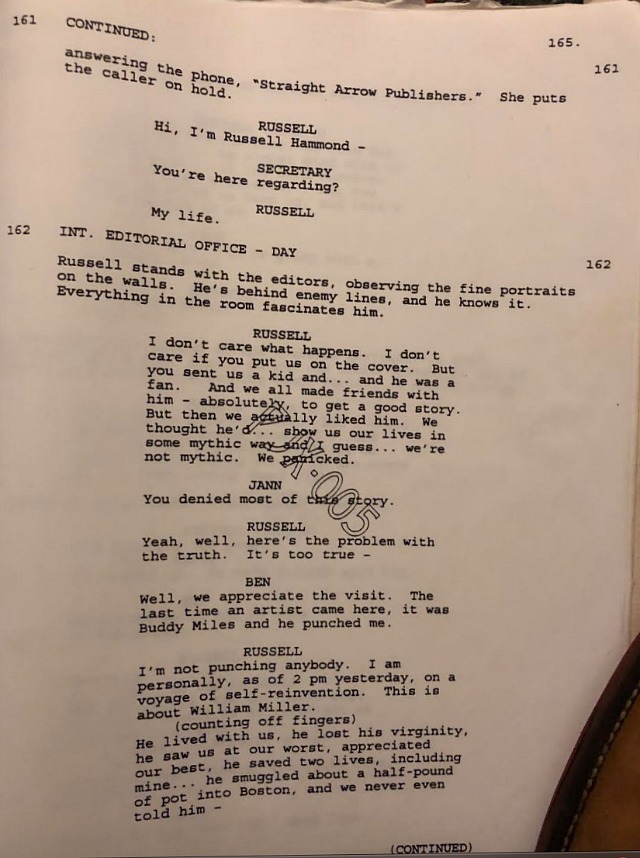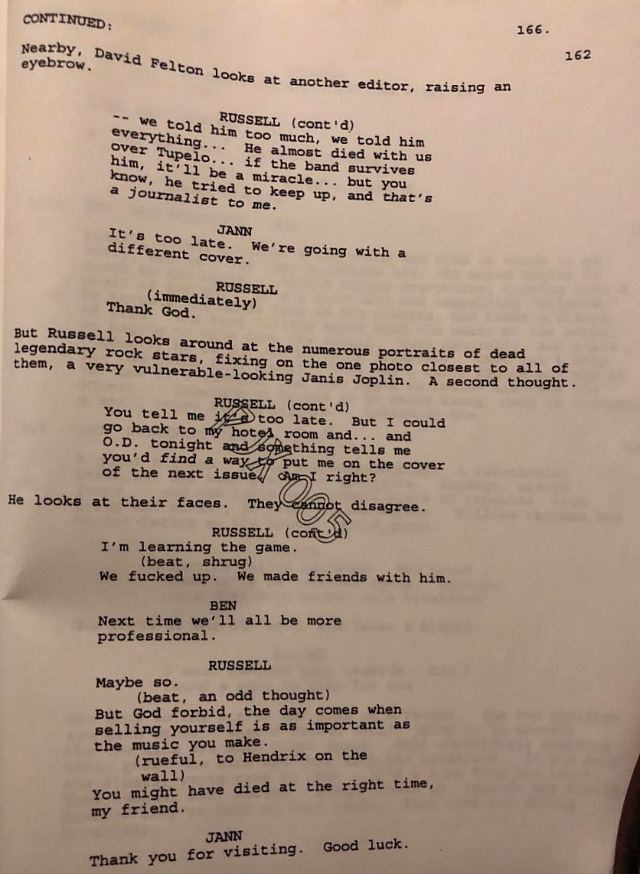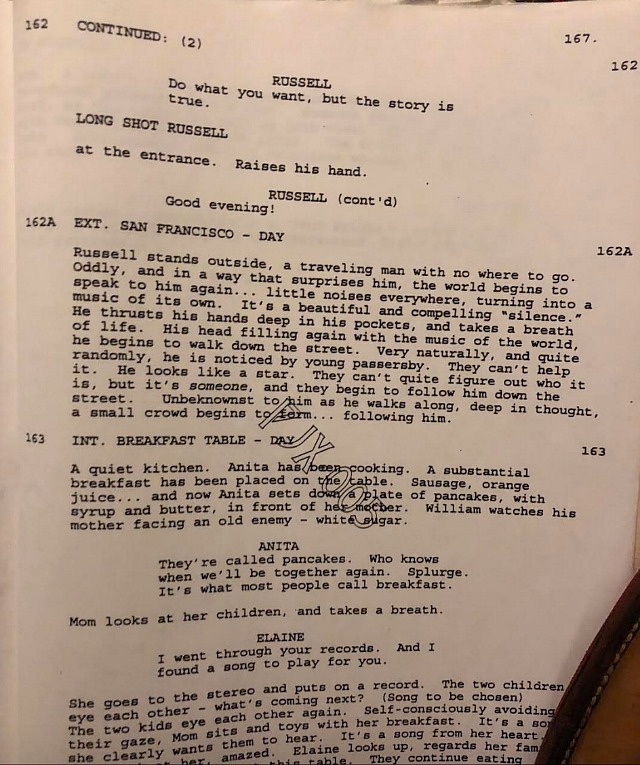I fell hard for Cameron Crowe‘s Almost Famous nine or ten months before it opened in September 2000, or when I came across a 1998 draft of the script (called “Untitled”, 168 pages). I didn’t just like or admire it — I was blown away, head over heels.
I was generally delighted with the film but it didn’t get me off like the script did because it felt a little too compressed here and there. It ran 122 minutes, in part because Dreamworks producer Walter Parkes kept insisting on “shorter, shorter, shorter.” Plus the film didn’t include a “Russell Hammond confesses all to Rolling Stone editors” scene that I thought was perfect.
I’ve had Almost Famous on my best of the 21st Century list for two decades now as it’s 90% of a great film, but I didn’t completely tumble until the 162-minute “director’s cut” bootleg Bluray came out in 2011.
I attended a big Almost Famous press shebang during the 2000 Toronto Film Festival, and a moment from that event is burned into my memory. I was shuffling into the main restaurant where the party was taking place, and in a center booth I saw L.A. Times critic Kenneth Turan chatting with Crowe and then-wife Nancy Wilson. And I was almost startled by a look in Turan’s eyes — a look of absolute rapture that reminded me of a ninth-grader swooning over his prom date and dreaming about some act of exquisite erotic kindness that might be in the offing later that evening.
Turan, in short, was making goo-goo eyes at Crowe…talking to the man of the moment was filling him with awe and joy and ecstasy, and his eyes…his eyes were doing ring-a-ding-ding backflips. Turan was in love…completely fluttering with feeling.
And at that very moment I made a mental note to myself, to wit: “Don’t ever give anyone slavish goo-goo eyes for any reason or under any circumstance…show respect and admiration but keep your cool…hold on to your dignity. Because if you don’t show a modicum of restraint the filmmaker will remember those goo-goo eyes, and if you don’t goo-goo him the next time he’ll know you don’t like the new film as much as the older one, or he’ll conclude that you were being a phony the first time.”
Let this be a lesson to us all. The next time you find yourself chatting with someone you genuinely admire, don’t flash the goo-goo eyes!
“Almost Famous Scene That Never Happened,” posted on 5.3.19:
Almost Famous is a largely autobiographical saga about a teenaged, San Diego-residing Crowe stand-in (called William Miller in the script and played by Patrick Fugit) landing a Rolling Stone assignment to profile an up-and-coming band called Stillwater, which had a star performer called Russell Hammond (Billy Crudup).
William hangs out with the band, gets into all kinds of wild-ass adventures, gets to know the Stillwater groupies and so on. After a false start he eventually turns in an honestly written article to Rolling Stone.
Russell and the band members are alarmed when the fact-checker calls. Fearful of being portrayed as insecure dipshits, they lie by insisting that Miller’s account is fiction. The article is killed, and William returns home in a state of defeat and total exhaustion.
The final graph of the Wiki synopsis: “Russell feels guilty for betraying William. He calls Penny Lane (Kate Hudson) and wants to meet with her, but she tricks him by giving him William’s address. He arrives and finds himself face-to-face with William’s mother (Frances McDormand), who scolds him for his behavior. Russell apologizes to William and finally gives him an interview. Russell, we learn, has verified William’s article to Rolling Stone, which runs it as a cover feature. Penny fulfills her long-standing fantasy to go to Morocco. Stillwater again tours only by bus.”
The scene that I loved so much shows a guilt-stricken Russell visiting the offices of Rolling Stone and admitting to Jann Wenner, Ben Fong Torres and David Felton that William’s article is an honest account.
The best moment happens when the Rolling Stone guys tell Hammond that they appreciate his honesty, but he’s arrived too late and they’re running another cover story (i.e., not about Stillwater). Hammond initially says “thank God” after hearing this, but then he says, “You tell me it’s too late, but something tells me if I were to go back to my hotel room and O.D., you’d find a way to put me on the cover of the next issue…right?”
I’ve had this script in a file cabinet for 20 years, and this is the first time I’ve posted these now-yellowed pages:















